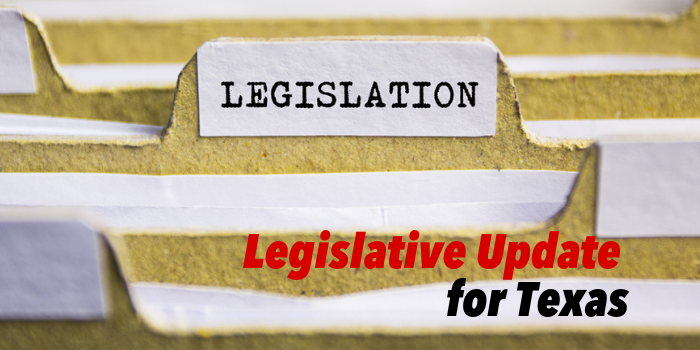The 2019 legislative session recently ended, and we at SpectrumAM would like to inform our boards that little was passed that will impact SpectrumAM’s clients or the association management industry in general. Like many bills, most of the items discussed at the beginning of the session failed to make it out of committee, and some of those that did are vastly different than when they initiated.
Below, we’ll discuss each bill that made it through the process this session:
SB 741
This adds a section to Property Code 202.020 that prohibits an association from enforcing a provision that prohibits, restricts, or has the effect of prohibiting or restricting a person who is otherwise authorized to legally possess, transport, discharge, or store a firearm or any part of a firearm or ammunition. Bear in mind that most rules and regulations regarding weapons are city, county, state, and federal rules, not individual HOA rules.
This bill passed and was signed by the governor on June 14, 2019. It goes into effect September 1, 2019.
HB 302
This law impacts only condo owner associations that are governed by Chapter 81 and Chapter 82 of the property code. The law change allows an owner, a guest of an owner, or tenant of an owner who is a licensed handgun owner to carry the weapon en route from the parking lot to the unit, or from the unit to the parking lot, to carry or store the handgun in the unit, carry or store the handgun in the license holder’s vehicle, or to carry the handgun en route to or from the unit to another location.
A condominium can no longer prohibit a licensed handgun owner from taking the necessary steps to carry the weapon to their residence or vehicle.
This has been signed by the governor and goes into effect on September 1, 2019.
HB 1025
There are two components to this bill:
The first allows an association to create rules that would structure board membership for communities with multiple sections to reserve certain spots on the board for specific sections. For example, if a community has five sections and five directors, they could designate that one director come from each section to represent the section. In order to structure a community like this, the board would need to seek a bylaw amendment drafted by association counsel.
The second component to this bill prohibits electing members of the board that cohabitate. A person cannot serve on the board if the person cohabits at the same primary residence with another board member. (This would not impact any board members already elected; they could serve the remainder of their term. However, upon expiration of their respective terms, both could not seek reelection.)
This will not apply to associations still in the development period, or associations with 10 or fewer lots.
This bill has been passed and was signed by the governor on June 14, 2019. It goes into effect on September 1, 2019; however, the cohabitation component went into effect immediately.
HB 2554
This bill transfers Section 202.009 to Chapter 259 Election Code. While there is a slight to change to the language, striking of the word “political” in front of “candidate” and striking “ballot item” and replacing it with “measure”, this does not effect any real changes based on the defined terms in Chapter 259.
This bill has been passed and was signed by the governor on June 10, 2019. It will go into effect September 1, 2019.
HB 234
Coined the “Lemonade Bill,” this bill modifies 202.020 Property Code to prohibit a property owners’ association from adopting or enforcing a rule that prohibits or regulates the occasional sale of lemonade or other non-alcoholic beverages from a stand on property by an individual younger than 18 years old, with permission from the property owner.
The association may not create a rule that mandates the issuance of a permit, or to charge a fee. However, this does not stop the HOA from prohibiting these types of sales on common areas, as the law requires the property owner’s permission; therefore, common area usage would require the HOA’s permission. This law also specifically states that the HOA would not be liable if any injury were to occur as a result of these sales.
This bill has passed and was signed by the governor on June 14, 2019. It will go into effect September 1, 2019.
HB 347
This bill has been signed and was put into effect immediately. It addresses the procedures under which municipalities can annex areas into cities.
There have been several news articles in the state related to forced annexations, as Texas has used a tier system which allows rural areas adjacent to larger cities to be annexed into the city without consent. Only counties with populations over 500,000 or those that petitioned with 10% to get it on a ballot and pass it were provided Tier 2 status that required owner consent for annexation. As the state continues to experience population growth and urban sprawl continues between large cities (for example, the I-35 corridor between San Antonio and Austin), the annexation without consent in rural areas was bound to continue.
HB 347 abolishes the Tier 1 and Tier 2 designations and creates an annexation process that requires the consent from land owners in the affected area(s) by either vote or petition. There are circumstances where annexation without consent can occur; however, this authority has been limited to very specific circumstances. While this is not an HOA-specific piece of legislation, these rule changes are good to know for our clients residing outside of city limits.
At the beginning of the session, there were bills related to fine regulation, limitation of declarant rights, short term rentals, religious displays, and chickens. These bills did not pass, but this is not to say that we won’t see them again.
We at SpectrumAM hope you found this 2019 Legislative Update helpful and informative. We’ll be sure to keep you apprised of any future developments. Thank you for your continued partnership.







